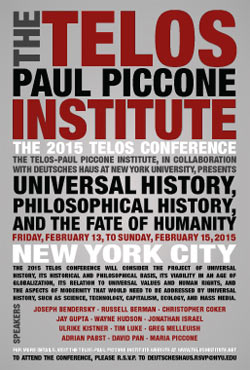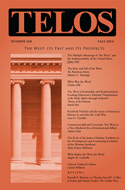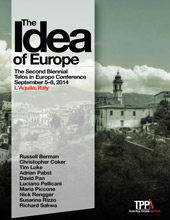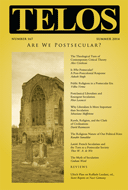By Robert Wyllie · Monday, April 6, 2015  Archaeologists have found the oldest known example of complex intergenerational cooperation at Göbekli Tepe in southern Turkey. Thirty miles away, just across the Syrian border, is the latest flashpoint of a complex intergenerational conflict—what President Obama calls the “barbarism” of the Islamic State.[1] What does the world’s oldest civilization have to do with the world’s newest barbarians? Both show the fundamental role of religion in organizing human societies. Viewing civilization as the product of religion bucks a long academic tradition. A consensus holds that human culture is an adaptive response to the environment. Ecological factors shape the economic base of society, molding civilizations in different ways. Thus, in the “Neolithic Revolution” hypothesis of V. Gordon Childe, civilization originated when the global climate warmed some 12,000 years ago, such that human beings could cultivate grains in fertile river valleys (Mesopotamia, Egypt, India, and China). This was the economic base upon which a civilizational superstructure—hierarchies, regimes, and religion itself—was built. Archaeologists have found the oldest known example of complex intergenerational cooperation at Göbekli Tepe in southern Turkey. Thirty miles away, just across the Syrian border, is the latest flashpoint of a complex intergenerational conflict—what President Obama calls the “barbarism” of the Islamic State.[1] What does the world’s oldest civilization have to do with the world’s newest barbarians? Both show the fundamental role of religion in organizing human societies. Viewing civilization as the product of religion bucks a long academic tradition. A consensus holds that human culture is an adaptive response to the environment. Ecological factors shape the economic base of society, molding civilizations in different ways. Thus, in the “Neolithic Revolution” hypothesis of V. Gordon Childe, civilization originated when the global climate warmed some 12,000 years ago, such that human beings could cultivate grains in fertile river valleys (Mesopotamia, Egypt, India, and China). This was the economic base upon which a civilizational superstructure—hierarchies, regimes, and religion itself—was built.
Continue reading →
By Angelo M. Codevilla · Monday, November 17, 2014 Angelo M. Codevilla’s “What Makes the West the West?” appears in Telos 168 (Fall 2014). Read the full version online at the Telos Online website, or purchase a print copy of the issue in our store.
 The intellectual-moral propositions that make the West the West are particular and exclusive to our civilization. They are indefensible, incomprehensible nonsense except in terms of Jerusalem and Athens. The ideas that distinguish the West’s forma mentis follow from the Biblical teaching that God created the universe by and through logos. This beckons our reason. The charter of human equality and freedom, unique to the West, is the Biblical teaching that man is created in the image and likeness of God. The West’s distinctiveness follows as well from Parmenides of Elea’s distinction between opinions and the truth of “the things that are.” This empowered human reason to access the logos of the universe. Consequently, reason distinguished between positive law—what is right by human will—and what is right by nature—natural law. The intellectual-moral propositions that make the West the West are particular and exclusive to our civilization. They are indefensible, incomprehensible nonsense except in terms of Jerusalem and Athens. The ideas that distinguish the West’s forma mentis follow from the Biblical teaching that God created the universe by and through logos. This beckons our reason. The charter of human equality and freedom, unique to the West, is the Biblical teaching that man is created in the image and likeness of God. The West’s distinctiveness follows as well from Parmenides of Elea’s distinction between opinions and the truth of “the things that are.” This empowered human reason to access the logos of the universe. Consequently, reason distinguished between positive law—what is right by human will—and what is right by nature—natural law.
Continue reading →
By Mary Frances McKenna · Thursday, October 30, 2014  In this article, I focus on the impact on modern Western thinking, ideas, and engagement with the world of the loss of the assumption of a creator, or an intelligent ordering agent, in conjunction with the emphasis on detail in preference to the whole in modern thought. I begin by discussing some of the critical dynamics contributed by Jerusalem, Athens, and Rome to the concept of Europe in an attempt to identify the source of the energy and vitality arising from this synthesis. I particularly look at the synthesis of Jerusalem and Athens, specifically how each influenced the other and where the potential for synergy arose. This Western synthesis no longer operates in Europe and the West. In this article, I focus on the impact on modern Western thinking, ideas, and engagement with the world of the loss of the assumption of a creator, or an intelligent ordering agent, in conjunction with the emphasis on detail in preference to the whole in modern thought. I begin by discussing some of the critical dynamics contributed by Jerusalem, Athens, and Rome to the concept of Europe in an attempt to identify the source of the energy and vitality arising from this synthesis. I particularly look at the synthesis of Jerusalem and Athens, specifically how each influenced the other and where the potential for synergy arose. This Western synthesis no longer operates in Europe and the West.
Continue reading →
By Mario Bosincu · Thursday, October 2, 2014 The following paper was presented at the recent Telos in Europe conference on “The Idea of Europe,” held in L’Aquila, Italy, on September 5–8, 2014.
 In a paragraph of Daybreak, Nietzsche spoke of Romanticism’s “great reaction”[1] to the Enlightenment. Zeev Sternhell has brought out two distinctive elements of this centuries-long European revolt against the “rationalist modernity”:[2] the rejection of the claim to “mold people’s lives” by means of enlightened reason, and the reevaluation of faith as “an essential foundation of society”[3] accompanied by the idealization of the spiritually united medieval civilization as contrasted with the atomized modern society in the grip of decadence. This current of thought was the symptom of the crisis of the pre-Enlightenment traditional societies, described by Professor Pellicani as closed, static, rigidly prescriptive cultural universes in which, to cite Jaspers, “everything is under the control of symbols of being, held fast in unquestioned orders.”[4] The anti-Enlightenment movement aimed precisely at refounding these collapsed civilizations. One thinks of Novalis’s picture of medieval Europe pacified by the all-binding force of Christendom embodied by the clergy exercising a pastoral power in order to reshape men into salvation-worthy subjects. In a paragraph of Daybreak, Nietzsche spoke of Romanticism’s “great reaction”[1] to the Enlightenment. Zeev Sternhell has brought out two distinctive elements of this centuries-long European revolt against the “rationalist modernity”:[2] the rejection of the claim to “mold people’s lives” by means of enlightened reason, and the reevaluation of faith as “an essential foundation of society”[3] accompanied by the idealization of the spiritually united medieval civilization as contrasted with the atomized modern society in the grip of decadence. This current of thought was the symptom of the crisis of the pre-Enlightenment traditional societies, described by Professor Pellicani as closed, static, rigidly prescriptive cultural universes in which, to cite Jaspers, “everything is under the control of symbols of being, held fast in unquestioned orders.”[4] The anti-Enlightenment movement aimed precisely at refounding these collapsed civilizations. One thinks of Novalis’s picture of medieval Europe pacified by the all-binding force of Christendom embodied by the clergy exercising a pastoral power in order to reshape men into salvation-worthy subjects.
Continue reading →
By John Milbank and Adrian Pabst · Thursday, August 14, 2014 We agree with Joshua Ralston that all forms of religious fundamentalism demand both universal and unconditional condemnation as well as regional and global responses to help all the victims—irrespective of their faith. We also agree with him that it is wrong to judge age-old religious traditions by modern secular, liberal standards and that essentialized notions distort complex cultural and historical realities.
Continue reading →
By Russell A. Berman · Monday, June 16, 2014  Critical theory inherited classical accounts of social change that linked modernization processes to secularization: in order for societies to overcome traditionalist structures and pursue the accelerated development of modernity, they would have to escape the grip of religion. This is perhaps most famously the case for Marx, who, in the introduction to his Critique of Hegel’s Philosophy of Right, declared religion “the opium of the people,” blocking the way of progress: “The abolition of religion as the illusory happiness of the people is the demand for their real happiness. To call on them to give up their illusions about their condition is to call on them to give up a condition that requires illusions. The criticism of religion is, therefore, in embryo, the criticism of that vale of tears of which religion is the halo.” To surmount a social condition that produces unhappiness requires renouncing the systematic concealing of that condition which is, so Marx, the genuine function of religion, the ultimate paradigm of ideology as false consciousness. Critical theory inherited classical accounts of social change that linked modernization processes to secularization: in order for societies to overcome traditionalist structures and pursue the accelerated development of modernity, they would have to escape the grip of religion. This is perhaps most famously the case for Marx, who, in the introduction to his Critique of Hegel’s Philosophy of Right, declared religion “the opium of the people,” blocking the way of progress: “The abolition of religion as the illusory happiness of the people is the demand for their real happiness. To call on them to give up their illusions about their condition is to call on them to give up a condition that requires illusions. The criticism of religion is, therefore, in embryo, the criticism of that vale of tears of which religion is the halo.” To surmount a social condition that produces unhappiness requires renouncing the systematic concealing of that condition which is, so Marx, the genuine function of religion, the ultimate paradigm of ideology as false consciousness.
Continue reading →
|
|
 Archaeologists have found the oldest known example of complex intergenerational cooperation at Göbekli Tepe in southern Turkey. Thirty miles away, just across the Syrian border, is the latest flashpoint of a complex intergenerational conflict—what President Obama calls the “barbarism” of the Islamic State.[1] What does the world’s oldest civilization have to do with the world’s newest barbarians? Both show the fundamental role of religion in organizing human societies. Viewing civilization as the product of religion bucks a long academic tradition. A consensus holds that human culture is an adaptive response to the environment. Ecological factors shape the economic base of society, molding civilizations in different ways. Thus, in the “Neolithic Revolution” hypothesis of V. Gordon Childe, civilization originated when the global climate warmed some 12,000 years ago, such that human beings could cultivate grains in fertile river valleys (Mesopotamia, Egypt, India, and China). This was the economic base upon which a civilizational superstructure—hierarchies, regimes, and religion itself—was built.
Archaeologists have found the oldest known example of complex intergenerational cooperation at Göbekli Tepe in southern Turkey. Thirty miles away, just across the Syrian border, is the latest flashpoint of a complex intergenerational conflict—what President Obama calls the “barbarism” of the Islamic State.[1] What does the world’s oldest civilization have to do with the world’s newest barbarians? Both show the fundamental role of religion in organizing human societies. Viewing civilization as the product of religion bucks a long academic tradition. A consensus holds that human culture is an adaptive response to the environment. Ecological factors shape the economic base of society, molding civilizations in different ways. Thus, in the “Neolithic Revolution” hypothesis of V. Gordon Childe, civilization originated when the global climate warmed some 12,000 years ago, such that human beings could cultivate grains in fertile river valleys (Mesopotamia, Egypt, India, and China). This was the economic base upon which a civilizational superstructure—hierarchies, regimes, and religion itself—was built.  The intellectual-moral propositions that make the West the West are particular and exclusive to our civilization. They are indefensible, incomprehensible nonsense except in terms of Jerusalem and Athens. The ideas that distinguish the West’s forma mentis follow from the Biblical teaching that God created the universe by and through logos. This beckons our reason. The charter of human equality and freedom, unique to the West, is the Biblical teaching that man is created in the image and likeness of God. The West’s distinctiveness follows as well from Parmenides of Elea’s distinction between opinions and the truth of “the things that are.” This empowered human reason to access the logos of the universe. Consequently, reason distinguished between positive law—what is right by human will—and what is right by nature—natural law.
The intellectual-moral propositions that make the West the West are particular and exclusive to our civilization. They are indefensible, incomprehensible nonsense except in terms of Jerusalem and Athens. The ideas that distinguish the West’s forma mentis follow from the Biblical teaching that God created the universe by and through logos. This beckons our reason. The charter of human equality and freedom, unique to the West, is the Biblical teaching that man is created in the image and likeness of God. The West’s distinctiveness follows as well from Parmenides of Elea’s distinction between opinions and the truth of “the things that are.” This empowered human reason to access the logos of the universe. Consequently, reason distinguished between positive law—what is right by human will—and what is right by nature—natural law.  In a paragraph of Daybreak, Nietzsche spoke of Romanticism’s “great reaction”[1] to the Enlightenment. Zeev Sternhell has brought out two distinctive elements of this centuries-long European revolt against the “rationalist modernity”:[2] the rejection of the claim to “mold people’s lives” by means of enlightened reason, and the reevaluation of faith as “an essential foundation of society”[3] accompanied by the idealization of the spiritually united medieval civilization as contrasted with the atomized modern society in the grip of decadence. This current of thought was the symptom of the crisis of the pre-Enlightenment traditional societies, described by Professor Pellicani as closed, static, rigidly prescriptive cultural universes in which, to cite Jaspers, “everything is under the control of symbols of being, held fast in unquestioned orders.”[4] The anti-Enlightenment movement aimed precisely at refounding these collapsed civilizations. One thinks of Novalis’s picture of medieval Europe pacified by the all-binding force of Christendom embodied by the clergy exercising a pastoral power in order to reshape men into salvation-worthy subjects.
In a paragraph of Daybreak, Nietzsche spoke of Romanticism’s “great reaction”[1] to the Enlightenment. Zeev Sternhell has brought out two distinctive elements of this centuries-long European revolt against the “rationalist modernity”:[2] the rejection of the claim to “mold people’s lives” by means of enlightened reason, and the reevaluation of faith as “an essential foundation of society”[3] accompanied by the idealization of the spiritually united medieval civilization as contrasted with the atomized modern society in the grip of decadence. This current of thought was the symptom of the crisis of the pre-Enlightenment traditional societies, described by Professor Pellicani as closed, static, rigidly prescriptive cultural universes in which, to cite Jaspers, “everything is under the control of symbols of being, held fast in unquestioned orders.”[4] The anti-Enlightenment movement aimed precisely at refounding these collapsed civilizations. One thinks of Novalis’s picture of medieval Europe pacified by the all-binding force of Christendom embodied by the clergy exercising a pastoral power in order to reshape men into salvation-worthy subjects.  Critical theory inherited classical accounts of social change that linked modernization processes to secularization: in order for societies to overcome traditionalist structures and pursue the accelerated development of modernity, they would have to escape the grip of religion. This is perhaps most famously the case for Marx, who, in the introduction to his Critique of Hegel’s Philosophy of Right, declared religion “the opium of the people,” blocking the way of progress: “The abolition of religion as the illusory happiness of the people is the demand for their real happiness. To call on them to give up their illusions about their condition is to call on them to give up a condition that requires illusions. The criticism of religion is, therefore, in embryo, the criticism of that vale of tears of which religion is the halo.” To surmount a social condition that produces unhappiness requires renouncing the systematic concealing of that condition which is, so Marx, the genuine function of religion, the ultimate paradigm of ideology as false consciousness.
Critical theory inherited classical accounts of social change that linked modernization processes to secularization: in order for societies to overcome traditionalist structures and pursue the accelerated development of modernity, they would have to escape the grip of religion. This is perhaps most famously the case for Marx, who, in the introduction to his Critique of Hegel’s Philosophy of Right, declared religion “the opium of the people,” blocking the way of progress: “The abolition of religion as the illusory happiness of the people is the demand for their real happiness. To call on them to give up their illusions about their condition is to call on them to give up a condition that requires illusions. The criticism of religion is, therefore, in embryo, the criticism of that vale of tears of which religion is the halo.” To surmount a social condition that produces unhappiness requires renouncing the systematic concealing of that condition which is, so Marx, the genuine function of religion, the ultimate paradigm of ideology as false consciousness. 

